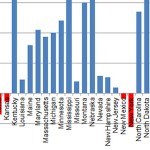Things We Read Today (16), Friday
Those for Whom Better Isn’t Good Enough
Peggy Noonan has now spent two columns beating up Mitt Romney’s campaign — one and two — and my first inference was that she’s building up momentum for another pre-election love letter to the much-cooler Barack Obama, such as she offered a few days before the 2008 election.
It’s a tell-tale sign of the rationalizer that she or he focuses on the stylistic slips of the side that she or he does not want to support, but knows that she or he should support, rather than the glaring problems of the side that she or he would rather support, aesthetically. Rather than looking at the history-changing faults of the executive in office, she’s obsessing over the performance weaknesses of the alternative candidate.
That’s suggestive, I think, of the larger issue. People for whom narrative is primary, a list including columnists, journalists, and (stereotypically speaking) people generally to the left of political center, find it more difficult to support the side that is, in practical terms, correct — if its storyline is unsatisfactory. And Barack Obama has cultivated a very, very good storyline.
It doesn’t matter that Mitt Romney is a competent executive (to understate). It doesn’t matter that he tithes times two-and-a-half and voluntarily pays more in taxes than the law requires. What matters is his noodle salad narrative.
What Noonan wants — and the reader can practically sense her salivating for it — is the whole package. As Steve Martin suggests in Roxanne, an ’80s update of Cyrano De Bergerac, we all want the right words, but especially when uttered beneath a “cute little nose.”
Compounding the problem is that even the raw stuff of the narrative is insufficient. The anecdotes showing Mitt to be a genuinely good person bounce off the media like bullets off a muscular man wearing tights with a giant “O” on the chest.
The romance requires the general public, speaking through its cultural elite, to fall in love and promote the story as the Truth of the Era. Whether Romney, the man, can measure up to the shadow is immaterial… even if the actual truth of the era is that the electorate really has to be mature and serious in its selection, this cycle, and acknowledge that problem-solvers aren’t necessarily Gatsbys.
ObamaCare’s Untouchable Panel and Pension Reform
As usual, the headline missed the point when reporting that portions of an AARP audience booed vice-presidential candidate Paul Ryan on the topics of Medicare and ObamaCare. In my view, the most relevatory statement of Ryan’s wasn’t that ObamaCare was designed to remove $700+ billion from Medicare, or even that the Independent Payment Advisory Board will be authorized to micromanage available health services.
Rather, the critical (and frightening) suggestion is that the IPAB represents a new strategy for managing practical necessities with the politics of governance:
So Obamacare represents a first step in their new approach: They want to take responsibility for these cuts out of the hands of your elected representatives and give it to unelected bureaucrats. They want to let them make the decisions – and let them take the heat.
Put aside the echoes of “death panels” and all that. What this reminds me of is the way-too-under-reported aspect of RI Treasurer Gina Raimondo’s pension reform that puts future adjustments in the hands of the Retirement Board, made up 7-of-15 of union interests.
Whatever the IPAB represents in terms of prescribing death for those whose necessary treatments are not cost-efficient, it appears to be indicative of the latest innovation in taking self-governance away from the governed.
The End of the Borrow-to-Spend Compromise
This Atlantic essay, by Peter Boone and Simon Johnson, which presents Japan’s government-investment complex as a model of the fate awaiting the world, is must-reading. Some of the authors’ final conclusions strike me as faulty, but they accurately describe the lay of the economic land:
Japan’s post-war economic miracle ended badly in the late 1980s, when the value of land and stocks spiked dramatically and then crashed. This boom-and-bust cycle left people, companies, and banks with debts that took many years to work off. Headline-growth rates slowed after 1990, leading some observers to speak of one or more “lost decades.”
But this isn’t the full picture: after a post-war baby boom, population growth in Japan decelerated sharply; the number of working-age people has declined fairly rapidly since the mid-’90s. Once you account for that, Japan’s economic performance looks much better. The growth in Japan’s output per working-age person—a measure of productivity for those who have jobs—has actually kept up with most of Europe’s, and has lagged only slightly behind that of the United States. Japan is a rich country with low unemployment. Its private sector is by no means broken. …
[But with a declining population], the Japanese government is using private savings to fund current spending, such as pensions and wage payments. With projected annual budget deficits between 7 and 10 percent of GDP, Japanese savers are essentially tendering their savings in return for newly issued government debt, which is not backed by hard assets. It is backed only by an aging, shrinking population of taxpayers.
The underlying problem for the modern world, right now, isn’t productivity or the access of residents to goods and services. Rather, the problem is that a mind-boggling proportion of the money in the economy has to be paid back. And the people on the receiving end are going to want it pretty soon, whether they are investors, retirees, foreign governments with their own problems to paper over, or whatever.
All of the quantitative easing that we’ve been seeing, in the United States, has essentially been a way to ensure that folks whose investments went south during the crash haven’t lost standing when it comes time to divvy up the declining wealth of the nation.
Another Non-Controversy
What’s that? An enemies list? Well, never you mind; all low-level functionaries, they swear.
The DOJ’s Office of Public Affairs appears to have enlisted Media Matters to serve as its unofficial PR wing — the one responsible for running smear campaigns too dirty for the Department to risk leaving fingerprints.
Media Matters is, of course, a far-left advocacy group that masquerades as a nonpartisan truth-teller and media watchdog.




